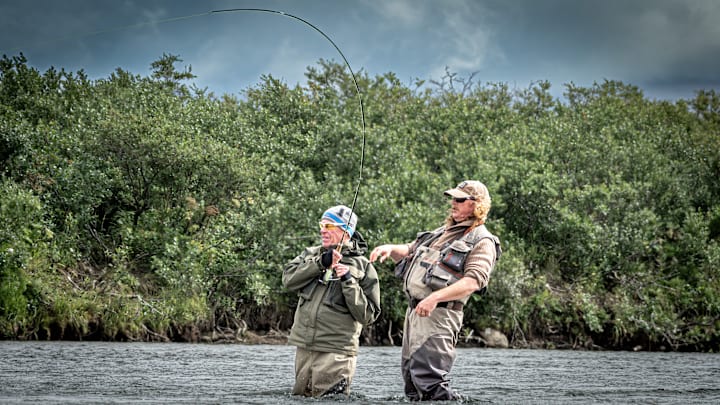Learn to Fly Fish: 5 Important Tips for the Beginner Angler

"The Journey of a Thousand Miles Begins with One Step" by Lao Tzu
Fly fishing has consumed me and given me a life. Even as a hobby, it was something I could get lost in. It challenged me creatively, physically, skillfully, and mentally. It is art, athletics, sport, intellectual pursuit, and the love of nature in one immersive obsession.
My First Step
This lifelong pursuit literally began with one step up a ladder to grab my father's old fiberglass fly rod. From there, it was a few more steps to the backyard to begin a lifelong practice of casting.
It's a love affair that gives more than it takes. It just won't seem that way at first. Like most beginnings, it can be frustrating. A lot of new information will come at you. That's OK, do it one step at a time. Here are five simple tips to get you started. These aren't the be-all and end-all. There are numerous pointers that could be listed. But five is a good place to start.
The Best Approach To Learning How to Fly Fish
Before I start with the tips, I want to give you this one pointer you can use the rest of your life. When things about this sport get frustrating, and they will, you will probably be standing knee-deep in a river or around water. Just stop and take in where you are. This is a big reason why we do this sometimes maddening sport—so we can be in nature. Sit on a rock, enjoy being there while you untie that mess of a knot. If your casting is falling apart, give it a break while you explore the water. As anglers, we aren't on the roadside observing nature, we are in it, participating. Let that sink in, and the frustrations will dissipate.
5 Tips To Learning How to Fly Fish
1. What Water, What Fish? XXX
You are going to have to get a rod and reel. But before you decide on which rod and reel, you will have to know what kind of fish you want to fish for, and what water you want to fish. If you have a small river near you that has trout and you want to fish it, then that will dictate what weight/size fly rod and reel to get. Go to a fly shop and give them this information, and they can help you pick out the right rod and reel combo for the job.
2. The Rod and Reel You Learn on Doesn’t Have To Be Expensive
You are going to need a fly rod and reel, but you don't need a thousand-dollar rod and reel. Spend around three hundred bucks for a combo outfit, and when you outgrow it, it will be a good backup rod. Practice is more important than fancy gear.
3. A Fly Casting Lesson Will Save You Time and Frustration
Take a casting lesson from an instructor after you've put in 3 hours of practice. Here's what I think works best: Find a good casting video and study it. Don't worry about being perfect or grasping everything that is said. It's more important to see what a good cast looks like. Kids learn this way. They watch and then try and mimic.
How To Get the Most Out of a Fly Casting Lesson
Get in the reps, spread it over a few days until you've put in 3 hours of practice, and then book a casting lesson. Most fly shops provide them.
If you put in three hours before your first lesson, then you will show up with good questions and a better understanding of what the instructor is talking about when they speak of a good cast and a bad cast (because you will have made a lot of bad casts).
Go out and try it on your own, screw up, make horrible casts, figure some things out on your own, improve a little, and show up at your first lesson loaded with questions.
4. If Steph Curry Thinks It’s Important to Practice, so Should You
Do this forever. Steph Curry, the greatest shooter in basketball, is relentless about showing up and practicing his shot. In fly fishing, the cast is our shot. Go to a park, a football field, or your backyard, and get your reps in, always. That is the heart of it, reps. The more you actually have the rod in your hand and do the casting, the more you will begin to understand the physics and mechanics of a good cast. Support this with video study and help from other casters, and you will develop a good cast. But it all goes back to getting your reps in.
5. Hire a Fly Fishing Guide for a Day
The money you save by not buying a high-end fly rod and reel should be put into a day with a guide. This will save a lot of time and confusion in learning how to fly fish. Talk to a guide and explain to them that you are new to the sport, and you are more interested in learning than you are in catching. You want things explained to you; you want them to teach you about knots, flies, and all the things a beginner fly angler should know. You'd prefer to wade fish than fish from a boat; this way, you can explore your surroundings, look at insects, study the water, and learn how to read it. And you want to be able to ask questions. But it has to be the right guide. Not all guides want to spend the day as a teacher. Explain this to the fly shop when asking for a guide recommendation.
Some Fly Fishing Insight for Good Measure
- Get a pair of polarized sunglasses. They don't have to be expensive, but they do have to be polarized. This will protect your eyes from hooks and will enable you to see into the water.
- Orvis is your friend. Check to see if there is an Orvis brand store near you. They offer free fly fishing classes. This is a great opportunity to learn how to cast, to learn how to rig your gear, and to learn the "whys" and "whats" of fly fishing. Most importantly, it gives you an opportunity to ask questions.
- Read fly-fishing books. Not just "How to" books, but fiction like A River Runs Through It, The Complete McClane, Ernest Hemingway's Big Two-Hearted River, and all of John Gierach's work. These books will teach, give insight, motivate, move you, and keep you on the path.
These 5 tips are as good a place to start as any. The key is to start, and then keep at it. If it sticks you are in for a heck of a ride that satisfies, while keeping you wanting more. KB
“The gods do not deduct from man’s allotted span the hours spent in fishing.” - Herbert Hoover
